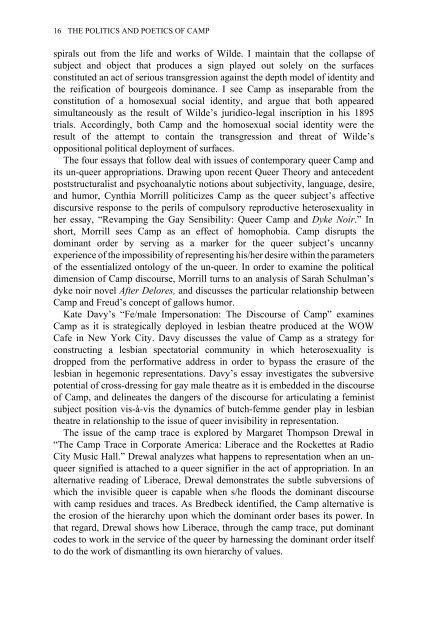Edited by Moe Meyer - Get a Free Blog
Edited by Moe Meyer - Get a Free Blog
Edited by Moe Meyer - Get a Free Blog
Create successful ePaper yourself
Turn your PDF publications into a flip-book with our unique Google optimized e-Paper software.
16 THE POLITICS AND POETICS OF CAMP<br />
spirals out from the life and works of Wilde. I maintain that the collapse of<br />
subject and object that produces a sign played out solely on the surfaces<br />
constituted an act of serious transgression against the depth model of identity and<br />
the reification of bourgeois dominance. I see Camp as inseparable from the<br />
constitution of a homosexual social identity, and argue that both appeared<br />
simultaneously as the result of Wilde’s juridico-legal inscription in his 1895<br />
trials. Accordingly, both Camp and the homosexual social identity were the<br />
result of the attempt to contain the transgression and threat of Wilde’s<br />
oppositional political deployment of surfaces.<br />
The four essays that follow deal with issues of contemporary queer Camp and<br />
its un-queer appropriations. Drawing upon recent Queer Theory and antecedent<br />
poststructuralist and psychoanalytic notions about subjectivity, language, desire,<br />
and humor, Cynthia Morrill politicizes Camp as the queer subject’s affective<br />
discursive response to the perils of compulsory reproductive heterosexuality in<br />
her essay, “Revamping the Gay Sensibility: Queer Camp and Dyke Noir.” In<br />
short, Morrill sees Camp as an effect of homophobia. Camp disrupts the<br />
dominant order <strong>by</strong> serving as a marker for the queer subject’s uncanny<br />
experience of the impossibility of representing his/her desire within the parameters<br />
of the essentialized ontology of the un-queer. In order to examine the political<br />
dimension of Camp discourse, Morrill turns to an analysis of Sarah Schulman’s<br />
dyke noir novel After Delores, and discusses the particular relationship between<br />
Camp and Freud’s concept of gallows humor.<br />
Kate Davy’s “Fe/male Impersonation: The Discourse of Camp” examines<br />
Camp as it is strategically deployed in lesbian theatre produced at the WOW<br />
Cafe in New York City. Davy discusses the value of Camp as a strategy for<br />
constructing a lesbian spectatorial community in which heterosexuality is<br />
dropped from the performative address in order to <strong>by</strong>pass the erasure of the<br />
lesbian in hegemonic representations. Davy’s essay investigates the subversive<br />
potential of cross-dressing for gay male theatre as it is embedded in the discourse<br />
of Camp, and delineates the dangers of the discourse for articulating a feminist<br />
subject position vis-à-vis the dynamics of butch-femme gender play in lesbian<br />
theatre in relationship to the issue of queer invisibility in representation.<br />
The issue of the camp trace is explored <strong>by</strong> Margaret Thompson Drewal in<br />
“The Camp Trace in Corporate America: Liberace and the Rockettes at Radio<br />
City Music Hall.” Drewal analyzes what happens to representation when an unqueer<br />
signified is attached to a queer signifier in the act of appropriation. In an<br />
alternative reading of Liberace, Drewal demonstrates the subtle subversions of<br />
which the invisible queer is capable when s/he floods the dominant discourse<br />
with camp residues and traces. As Bredbeck identified, the Camp alternative is<br />
the erosion of the hierarchy upon which the dominant order bases its power. In<br />
that regard, Drewal shows how Liberace, through the camp trace, put dominant<br />
codes to work in the service of the queer <strong>by</strong> harnessing the dominant order itself<br />
to do the work of dismantling its own hierarchy of values.


